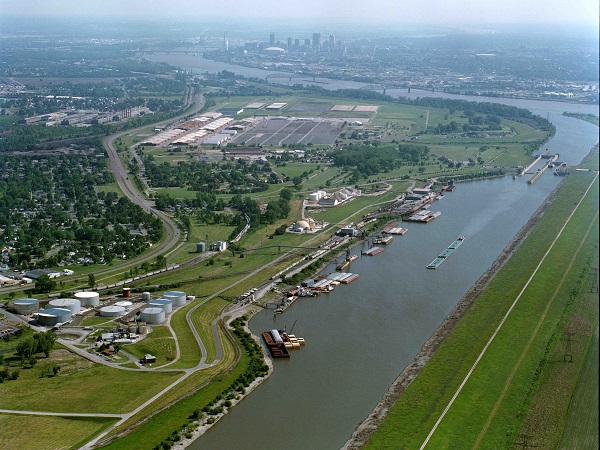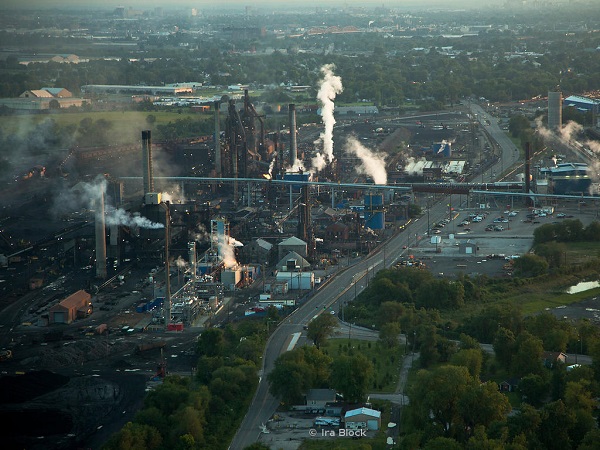Apply now to join our next cohort of Community Science Fellows and Community Leads!

The Granite City-TEX project on “Improving Local Air Quality” was launched to help the city monitor air quality in a way that is accessible to and engaging with city residents, to work with city residents and leaders to understand and inform local perceptions of air quality, and, perhaps most importantly, brainstorming and implementing visible and effective ways to further improve air quality. This project began in May 2015 and concluded in April 2017. The project team consisted of Jay Turner, Vice Dean and Associate Professor for Energy, Environmental & Chemical Engineering at Washington University in St. Louis and James Amos, Economic Development Director for Granite City, IL. Granite City was connected to TEX through ICLEI – Local Governments for Sustainability.
The Granite City-TEX project featured two parallel initiatives: collaboration with the Granite City Cool Cities Committee to finalize the city’s sustainability plan and complementary research projects to shed light on the sustainability commission’s air quality objectives.
Granite City and the Cool Cities Committee completed the sustainability plan in early 2017. It is scheduled for a vote on final approval to forward the finalized plan to City Council for potential review/adoption on July 11, 2017. During its development, the Committee relied on Jay to provide technical input and advice regarding goals and content on an ad hoc basis. Jay’s inputs enabled the city to focus on practical solutions (e.g. avoiding a billboard that “eats” pollution, and instead pursuing green updates to City Hall), helping the city approach sustainability from a position of confidence. Jay also helped the city translate elements of the sustainability plan into actionable plans that can provide near-term success, thereby putting the city on the pathway to sustainability – and avoiding placing the sustainability plan on the shelf.
Meanwhile, Jay supervised a team of undergraduate students in the completion of a preliminary greenhouse gas inventory for Granite City municipal operations. The team of students had the opportunity to meet with James in Granite City and lean about community-science engagement and what it means to apply their science in a community context. Both the students (and Jay!) learned important lessons about city-scale data collection and thinking about how to ask the right questions for what they needed to conduct the analysis. The results of this analysis have been shared with the city for consideration. Future opportunities might include an expansion of scope to include industrial and residential activities.
A secondary planned research effort, which unfortunately never got off the ground, involved the analysis of particulate matter emissions from a local steel mill by a PhD student. Despite the tremendous value of this work for establishing a quantitative baseline for air quality emissions, it was unable to be completed due to an extended shutdown of the steel mill in question.
Today, the work and lessons learned from the Granite City-TEX collaboration are being implemented as part of the city’s newly launched (February 2016) Grow Granite Network, which includes key development areas including: Business Growth & Development; Housing, Neighborhood & Community Improvement; Education & Workforce; Entrepreneurship, Innovation & Creative Arts; and City Pride. The work of the Cool Cities Committee was integrated in this effort as a 6th key development area, i.e. Sustainability. Integrating Jay’s advice, the Grow Granite Network will bring sustainability issues to a higher level of public awareness in the community. Relevant news articles are available here and here. A website for the Grow Granite Network’s sustainability group will be live in a few months.
Near-term sustainability initiatives in the community are includes greening of the City Hall via lighting improvements, green purchasing and recycling. The community is also participating in the Green Cities Challenge, a St. Louis-wide initiative with the Missouri Botanical Gardens and several corporate partners.
In reflecting on the project and its outcomes, James felt that the TEX project’s scope of work provided value in helping the community frame and feel confident in moving forward a city-wide sustainability focus: “Jay helped us focus our efforts on what was most appropriate and attainable. The authority and weight [Jay’s knowledge brought to the group] helped us focus on the end goals we were trying to achieve.”
If you are interested in learning more about the specifics of this project, please contact James Amos, Economic Development Director for Granite City, IL, or Jay Turner, Associate Professor for Energy, Environmental & Chemical Engineering at Washington University in St. Louis. More information about the launch of these efforts is available in Granite City’s Economic Development Strategic Action Plan (2015), which called for a sustainability plan and the creation of what is now the Grow Granite Network.
Granite City is a small Midwestern town that is struggling with a legacy of air pollution. Much of this pollution is attributed to a local steel mill, which is also an important economic engine for the city. The steel mill has taken steps to reduce its emissions, but many residents are still dubious about the overall quality of the air.
The economic development director of Granite City, IL, James Amos, is working with local scientific partner Jay Turner to review the local sustainability plan. This work will include helping to monitor air quality in a way that is accessible to and engaging to city residents, working with city residents and leaders to understand and inform local perceptions of air quality, and, perhaps most importantly, brainstorming and implementing visible and effective ways to further improve air quality. This project began in May 2015, and will over the course of 18 months, improve air quality and help Granite City’s residents feel better about their air.
The economic development director of Granite City, IL has found a scientific partner to work with the city on local air quality. This work will include helping to monitor air quality in a way that is accessible to and engaging to city residents, working with city residents and leaders to understand and inform local perceptions of air quality, and, perhaps most importantly, brainstorming and implementing visible and effective ways to further improve air quality. A successful project will, over the course of 18 months, improve air quality and help Granite Ciy’s residents feel better about their air.

James Amos, the Economic Development Director of Granite City, and Dr. Jay Turner, Granite City’s scientific partner, are collaborating to help Granite City’s Cool Cities Commission finalize the city’s sustainability plan. Granite City aims to implement specific parts of the sustainability plan with Dr. Turner’s expertise in air quality.
Dr. Turner and his team of PhD and undergraduate students plan to engage in two projects that complement the city’s sustainability plan objectives: 1) complete a preliminary greenhouse gas inventory and 2) conduct passive sampling of particulate matter in the city. Undergraduate students enrolled in a for-credit class, “The Sustainability Exchange,” will devote 10-15 hours per week – for a total of 400-500 hours during the semester – developing a greenhouse gas inventory for Granite City and will have the opportunity to visit the city during the semester. Meanwhile, Dr. Turner’s PhD students, with the assistance of undergraduate researchers, will take the lead on discovering the origins of particulate matter emissions across the city.
Concerns expressed by the Granite City community about dust and visible particles settling onto city surfaces inspired this particulate matter research. However, a major challenge that Dr. Turner and his team face is their inability to obtain timely information about the operations of local emissions sources such as the steel mill, i.e. whether and for how long they are operating. Mr. Amos promised to ensure that the research team will be provided such information from the city as available.
Furthermore, eighty percent of Granite City’s sustainability plan has been completed, with the exception of the air quality component. By the end of July 2016, Granite City and the Cool Cities Commission expect to finalize the complete sustainability plan. Afterwards, the team will begin to think about moving forward with the implementation process. Execution of the sustainability plan will be facilitated by the inputs of Dr. Turner during the editing and review phase; he is in the process of suggesting language that will enable the city to translate elements of the sustainability plan into short-term success, thereby putting the city on the pathway to sustainability.
Dr. Jay Turner was selected as the scientific partner for the Granite City challenge. Jay is Associate Professor of Energy, Environmental, and Chemical Engineering and Vice Dean for Education in the School of Engineering & Applied Science at Washington University in St. Louis. His research focuses on air quality planning, management, and health impacts with emphasis on field studies and data analysis. He is a past president of the American Association for Aerosol Research (AAAR) and currently serves on the Science Advisory Board (SAB) to the U.S. Environmental Protection Agency.
James Amos is the Economic Development Director for the City of Granite City, Illinois. A life-long resident of the St. Louis Metro-East Illinois area, James has been tasked with fully implementing Granite City’s new Economic Development Strategic Action Plan (2015). Formerly, James helped found the successful non-profit Mission: St. Louis, which works to holistically redevelop impoverished neighborhoods and their people.

ICLEI USA – Local Governments for Sustainability and American Geophysical Union (AGU)’s Thriving Earth Exchange (TEX) partnered to advance knowledge and practices contributing to climate resilient communities across the United States.
(c) 2024 Thriving Earth Exchange